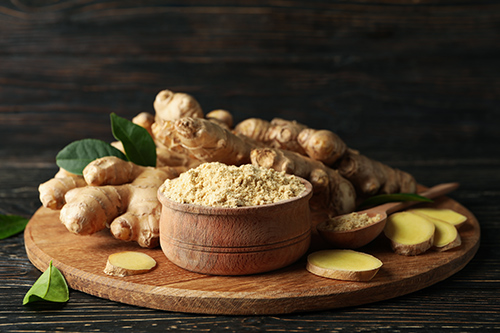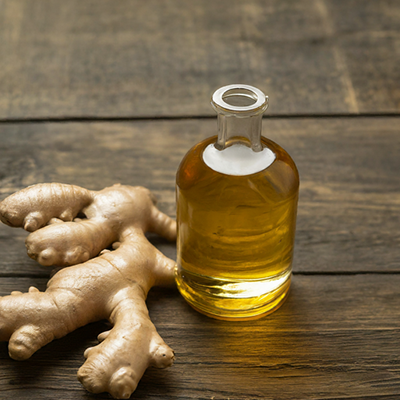Contents
Confucius wrote about the many health benefits of ginger about 2500 years ago. Traders carried ginger from Eastern Asia to the Mediterranean coast. It became the most sought-after spice in Rome, only second to pepper. Dioscorides (1st century A.D.) knew it and recommended it for those with weak stomachs.
It was exported to Europe during the Middle Ages, where it was highly appreciated, but it could never be cultivated there. In the early 16th century, the Spaniard Francisco de Mendoza was the first to carry its seeds to the “New World,” Its cultivation quickly spread along the West Indies, Mexico, and Peru.

Ginger Scientific Facts
- Scientific Name: Zingiber officinale Roscoe.
- Other Names: African ginger, black ginger, race ginger.
- French: Gingembre.
- Spanish: Jengibre.
- Environment: It is native to India and tropical countries of the Far East. It is common in Mexico and the West Indies, especially in Jamaica.
- Description: Vivacious plant of the Zingiberaceae family, growing up to 1 to 1.3 m high, with exuberant flowers resembling orchids. It reproduces through its aromatic rhizome.
- Parts of the plant used medicinally: The rhizome (underground stem).
Ginger Health Benefits

Ginger contains essential oil with several terpene derivatives, which give the plant its digestive and carminative (prevents gas formation in the digestive system) properties. It is also sudorific, and in India, there is a belief that it has aphrodisiac properties. Ginger is recommended to treat exhaustion, lack of appetite, bloated stomach, and flatulence.
Ginger helps cleanse the system through sweat. When hot, the tea is fantastic for scanty urine and suppressed menstruation. It stimulates digestion and brings heat to the system. When taken in frequent doses, it will raise body temperature. It is without competition regarding herbs that deal with motion, air, and sea sickness.
Ginger aids in reducing flatulent colic, and its effect is milder when combined with laxative herbs. It cleanses the colon, stimulates circulation, relieves cramps and spasms, cleanses the colon, and fights inflammation. Treat annoying cold symptoms by taking ginger at the onset.
It can also be utilized for stomach spasms, sinus congestion, nausea, morning sickness, colon spasms, headache, gas, indigestion, cramps, coughs, and contagious diseases. It is a potent antioxidant and germ killer for wounds and sores. You can chew the rootstock as is to stimulate saliva flow and soothe a sore throat. Ginger also helps to protect the stomach and liver and is helpful for vomiting, muscle pain, indigestion, hot flashes, fever, arthritis, and bowel disorders. Externally, ginger can be used as a fomentation to treat mumps.
Warning
Like almost all spices, ginger provokes gastritis in high doses. It is not recommended for people suffering from ulcers. We do not advise using alcoholic ginger tincture since it irritates the stomach.

How to use Ginger
- Seasoning – In small amounts for raw and cooked foods.
- Infusion
Infusion: Steep for five to fifteen minutes and take one fluid ounce at a time. Decoction: Simmer for five to fifteen minutes and take two ounces three times daily. Tincture: Take fifteen to sixty drops three times daily. Fluid Extract: Take five to twenty drops three times daily. Syrup: Take ½ to one teaspoon three times daily. Powder: Take two to four #0 capsules (10 to 20 grains) thrice daily. Take every two hours for nausea and vomiting.
DISCLAIMER: All content on this website is presented solely for educational and informational objectives. Do not rely on the information provided as a replacement for advice, diagnosis, or treatment from a qualified medical expert. If you are pregnant, nursing, or have any preexisting medical concerns, talk to your doctor before using any herbal or natural medicines.
REFERENCES
- George D. Pamplona-Roger, M.D. “Encyclopedia of Medicinal Plants.” George D. Pamplona-Roger, M.D. Encyclopedia of Medicinal Plants. Ed. Francesc X. Gelabert. Vols. 1 San Fernando de Henares: Editorial Safeliz, 2000. 377. Print. [ginger health benefits]
- Vance Ferrell Harold M. Cherne, M.D. The Natural Remedies Encyclopedia [Book]. – Altamont, TN: Harvestime Books, 2010. – Vol. Seventh Edition: 7: pp. 160.
- National Center for Complementary and Integrative Health Ginger Page: https://www.nccih.nih.gov/health/ginger
